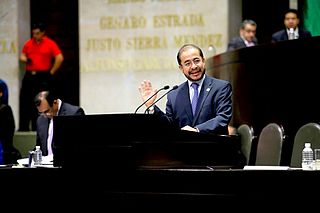
The Party of the Democratic Revolution is a state-level social democratic political party in Mexico. The PRD originated from the Democratic Current, a political faction formed in 1986 from the Institutional Revolutionary Party (PRI). The PRD was formed after the contested general election in 1988, which the PRD's immediate predecessor, the National Democratic Front, believed was rigged by the PRI. This sparked a movement away from the PRI's authoritarian rule.

The Labor Party is a political party in Mexico. It was founded on 8 December 1990. The party is currently led by Alberto Anaya.

The Broad Front is a centre-left peronist political party in Argentina most prominent in the 1990s. The party is currently part of the former ruling Unión por la Patria coalition which supported Sergio Massa's presidential campaign.

The New Alliance Party is a state-level political party in Mexico founded in 2005.

The Decentralist Social Force Party also known as Social Force was a centre-left, social democratic, Peruvian political party. Founded in 1997 as the Party for Social Democracy, it changed to its current name in 2007 after incorporating members of the CONREDES de Junín Movement and the Cajamarca Social Force movement.

Puerto Peñasco Municipality is a municipality in the Mexican state of Sonora in north-western Mexico. As of 2015, the municipality had a total population of 62,177 inhabitants. The only locality with a significant population is the municipal seat, also named Puerto Peñasco, which contains almost 99% of the municipality's population.
San Luis Río Colorado is a municipality in the Mexican state of Sonora in northwestern Mexico, covering an area of 8412.75 km2.
The National Regeneration Movement, commonly referred to by its syllabic abbreviation Morena, is a major left-wing populist political party in Mexico. As of 2023, it is the largest political party in Mexico by number of members; it has been the ruling party since 2018, and won a second term in the 2024 general election.

Social Encounter Party was a Mexican conservative political party established on the national level in 2014 and dissolved in 2018. It was part of the coalition Juntos Haremos Historia with the National Regeneration Movement and Mexico's Labor Party for the 2018 Mexican election.

Hugo Eric Flores Cervantes is a Mexican politician, attorney, and Neo-Pentecostal pastor. He founded the Social Encounter Party (PES), a conservative political party. He was the party's national president and one of its eight federal deputies in the LXIII Legislature of the Mexican Congress. He currently is president of the party’s successor, the Solidarity Encounter Party.
Citizens was a Chilean political party founded in 2013, with members comprising militants and independents of the center and center-left whose beliefs did not align with New Majority or Chile Vamos. Party militants mainly came from the Christian Democratic Party and the Party for Democracy.

Everyone for Mexico, was a political coalition encompassing the Institutional Revolutionary Party (PRI), New Alliance (PANAL), and the Ecologist Green Party of Mexico (PVEM) to compete in the 2018 Mexican general election led by the presumptive nominee José Antonio Meade Kuribreña. The campaign was previously known as Meade Ciudadano por México until INE deemed unconstitutional the usage of the name of a political candidate within the name of a coalition, stating that allowing it would make Meade receive extra benefit from every piece of propaganda of the coalition.

Legislative elections were held in Mexico on 6 June 2021. Voters elected 500 deputies to sit in the Chamber of Deputies for the 65th Congress. These elections took place concurrently with the country's state elections.

The Purple Party is a centrist, liberal and progressive Peruvian political party. The color purple was chosen to represent the blending of red and blue, the colors of left and right-wing parties in Peru, symbolizing the centrist ideology of the party.

The Solidary Party is a co-operatist political party in Argentina, founded by banker and politician Carlos Heller in 2007. It was part of the Frente de Todos coalition, and was part of the kirchnerist Front for Victory from its foundation until the alliance's dissolution in 2019. The party was also previously aligned with New Encounter. It is now a member of the Unión por la Patria, formed to support Sergio Massa's 2023 presidential campaign.
Generation for a National Encounter, sometimes known as the GEN Party or simply as GEN, is a centre-left political party in Argentina. It was founded in 2007 by Margarita Stolbizer as a split from the Radical Civic Union, in opposition to the UCR's endorsement of Roberto Lavagna's general election.

Progressive Social Networks was a Mexican center-left political party formed in 2020.

Fuerza por Mexico is a Mexican state-level political party. The party is progressive and sought to revolutionize the country's electoral demographic and break from the nation's traditional parties.

The Progressive Homeland was a Chilean political party founded in October 2022. It is considered the successor of the Progressive Party (PRO), a formation led by former congressman and former presidential candidate Marco Enríquez-Ominami. Its registration was accepted by the Electoral Service of Chile (Servel) in August 2023.















